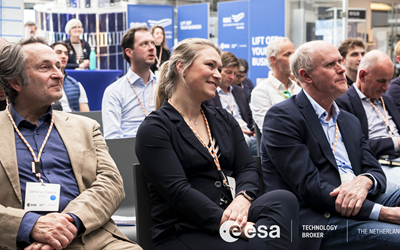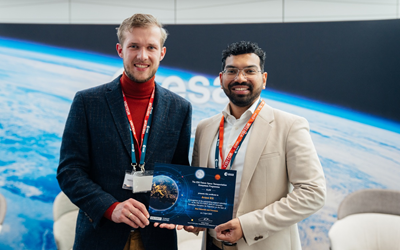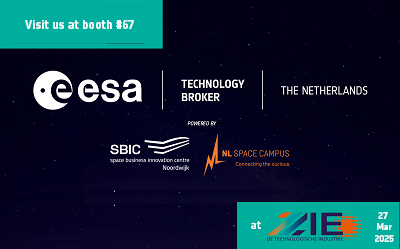What do you pack for an intercontinental flight? Easy: a change of clothes, a toothbrush, a good book. But millions of people in the EU have to add one more item to that list: a cooling device for their temperature-sensitive medication.
Patients suffering from rheumatism or MS, or using growth hormones or biological medical products have to keep their medication within 2 and 8 degrees Celsius. When travelling, this causes quite a hassle involving unreliable ice packs and impractical ice boxes, as Carla van den Bos – co-founder and CEO of Meds2Go – knows from experience.

The Meds2Go team with airplane
Team building
As a member of the LUMC patient’s association, Carla introduced the problem to the 2016 Dutch Hacking Health hackathon in Leiden. “I wasn’t sure this was the type of problem that health care innovators would be interested in, but I quickly found UX designer I-Chu Liao and two other team members to work on a possible solution, and we won second place!” Carla remembers.
The solution, a light-weight box that passively cools medication between 2 and 8 degrees Celsius for up to three days, was something that the two co-founders believed in and wanted to bring to market. So they started Meds2Go.
Providence helped them find their third team member and thermal engineer, Sanaz Saeid. “I used to work in the oil and gas industry, so I never would have imagined switching to the health care domain,” Sanaz recalls. “But one day I was browsing on meetup.com, which I normally never do, and I saw that Carla was looking for someone who knew about heating and cooling. “That’s me!” I thought.”

The Meds2Go team: I-Chu Liao, Sanaz Saeid and Carla van den Bos
Space tech
The team now had all skills it needed on board. Next requirement: the technology. “I figured: where do you find people in a small space, working in an environment with extreme temperature variation, with a lot of innovation? Space!” Carla explains.
Since no patents have been taken, the team is reluctant to talk about the actual technology behind their solution. But they do like to discuss the future of their business and their prototype, which for the next two years will be further developed within the ESA BIC program. Product launch is scheduled for early next year.
The team already knew about ESA BIC through the Space Business Open Day, but they took some time to evaluate whether the program would really be the place for them and would help them grow faster. What finally convinced them to apply were the offered tech support, and the possibility to share experiences with other startups. “At the very least, you learn which roads not to take,” Carla jokes.

Meds2Go with ESA BIC Noordwijk community manager Martijn Leinweber


